Musician: NOBODY’S GIRL
Video: “Waterline”
NOBODY’S GIRL KICKS OFF BLUE ROCK’S COOL NIGHTS 21 THIS THURSDAY, OCTOBER 21
Nobody’s Girl (Grace Pettis, Rebecca Loebe, BettySoo) will be featured at the Blue Rock aLive! Cool Nights 21 live streaming concert series—this Thursday, October 21. You can buy a Season Pass for only $105—and have a seat in the house by sending in your headshot. They will place the large headshot on a seat, so you will literally be sitting in the room.
Blue Rock’s innovation, quality and creativity is evidenced in concerts produced with broadcast quality audio-video from their renowned Texas room—streamed straight to you. For Tickets and Season Passes, go to: https://bluerocktexas.com/events
These three musicians are a strong force on their own, but together—Nobody’s Girl weaves powerful, intricate harmonies with lyrics that move the heart into action.
We talked with Nobody’s Girl about their approach to songwriting, their passion for writing songs that can help make a difference and what keeps them hopeful, as they combine art, poetry and a lot of love.
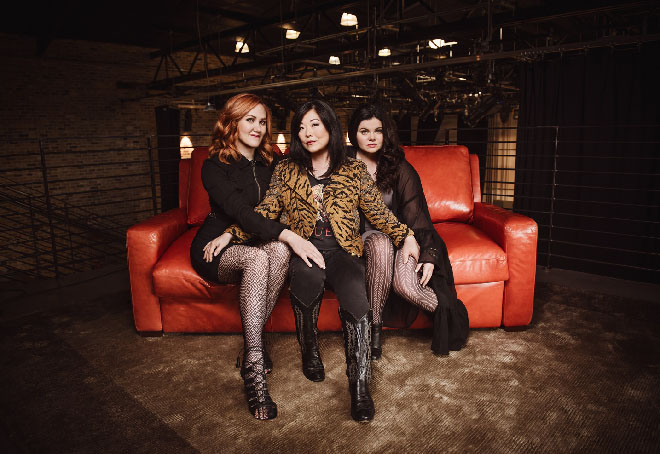
Photo credit Valerie Fremin Photography
NOBODY’S GIRL – BettySoo, Rebecca Loebe & Grace Pettis Interview
with M Music & Musicians magazine publisher, Merlin David
Tell us the story behind an original song you will play at Blue Rock’s Cool Nights 21 (for your October 21 performance).
BettySoo: We wrote “Lark” together when we were on tour in Ireland. Fortunately, Grace’s mother lives in Ireland and is an acclaimed poetry scholar, so not only did we enjoy the beautiful hospitality of Grace’s family, but we were surrounded by beauty—both outdoors and indoors—where there was art and poetry and a lot of love. We were looking out at the Irish landscape, replete with loamy earth, lush gardens and birds on wing—and the song took off.
Nobody’s Girl weaves powerful, intricate harmonies with lyrics that move the heart into action.
Rebecca: I enjoy playing “Tiger” live—with its intense harmonies. It’s rhythmic and percussive and almost spoken. The song idea came from a conversation we had about a poster that Grace had in her room as a child: “Tiger, Tiger burning bright.” It is about the rage and indignities we face and it’s almost like holding a tiger back. It’s a pop song about rage. (Laughs)
Who originally inspired you to write songs?
Grace: My Dad, Pierce Pettis. I grew up with his music. As a kid, I thought he was the best songwriter in the world. I still do. I thought, “Well, if he can do it—maybe I can too.” I wanted to at least try.
Rebecca: I grew up with my parents’ vinyl collection—50s and 60s girl groups—doo wop. I didn’t know about singer-songwriters until high school. It was the explosion of women—Jewel, Sarah McLachlan, Meredith Brooks, Ani DiFranco, Indigo Girls, Fiona Apple, Natalie Imbruglia. When I started writing in high school, it was bad preaching poetry, as a 12-year old—and I started playing guitar. I’m just glad YouTube didn’t exist back then! (Laughs) But writing provided validity. It was an empowering way to express myself.
BettySoo: I kind of stumbled into songwriting. I went to UT Austin, partly on a poetry scholarship. I originally envisioned becoming a creative writing teacher. I then wanted to be a harmony singer like J. D. Souther, who was on everyone’s albums. But I also performed on stage and decided I needed more—so I took an informal songwriting class. After the third week, we were supposed to bring a song—and I only realized it that morning. So I took my laptop to the breakfast table—and started writing a song. It was not a great song by any stretch. (Laughs) But it went over well in the class. After class, three or four songwriters approached me. One person even wanted to co-write with me. They were so encouraging. It gave me enough confidence to keep doing it—and I developed the love to keep writing songs.
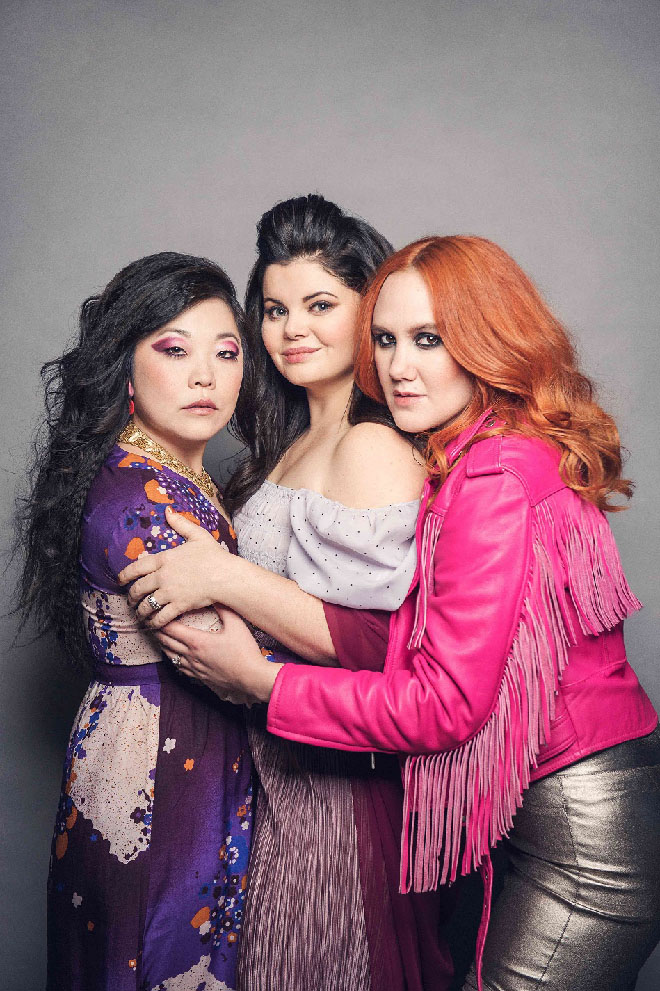
Photo credit Valerie Fremin Photography
What songwriting tip would you like to offer?
Rebecca: Get the first draft of a new song done as quickly as possible, and once you’re done with that first draft—keep going. Keep your old drafts, but continue polishing and revising until every line feels as strong as it can possibly be. Once you think the song is done, play it in a bunch of different grooves and keys—and switch around the narrative perspective to see if anything works better than what you already have.
Grace: My Dad said “save everything. When you’re starting out, you think your songs are terrible—save them anyway. Fill up notebooks. Write it all down. You’ll be a better songwriter years from now, and you can go back and mine those notebooks for inspiration. You can re-write those terrible songs and salvage whatever was working. Craft can be learned but inspiration is like gold. Save every single song idea you have.” I tell this to teenage songwriters—we feel things more intensely at that age than we ever will again. Nothing hurts like that first heartbreak. We can reanimate those feelings years down the line when we actually know how to do them justice—if we save the idea. Never throw anything away.
Whose idea was it to cover the classic “So Far Away”—originally released 50 years ago?
BettySoo: As much as any of the three of us wish we could claim one of us decided to do it, since we did want to cover a Carole King song, it was actually our label who suggested it.
What was it like to use the same piano used on those original Tapestry sessions?
BettySoo: Our producer, Michael Ramos, played the piano part as well as the trumpet solos. We were blown away by how beautifully it came out. We had no idea he played trumpet, but it was perfect.
The song seems especially timely during pandemic—when everyone seems so far away?
Rebecca: Believe it or not, we recorded that cover months before the pandemic started. (Laughs) Our label asked us if we’d be interested in covering a Carole King song—and of course we said yes, because she’s amazing. We landed on that particular tune because it’s moving in a very straightforward way and feels great to sing. Releasing it during a pandemic—that wasn’t even on the radar back when we recorded it—was definitely surreal.
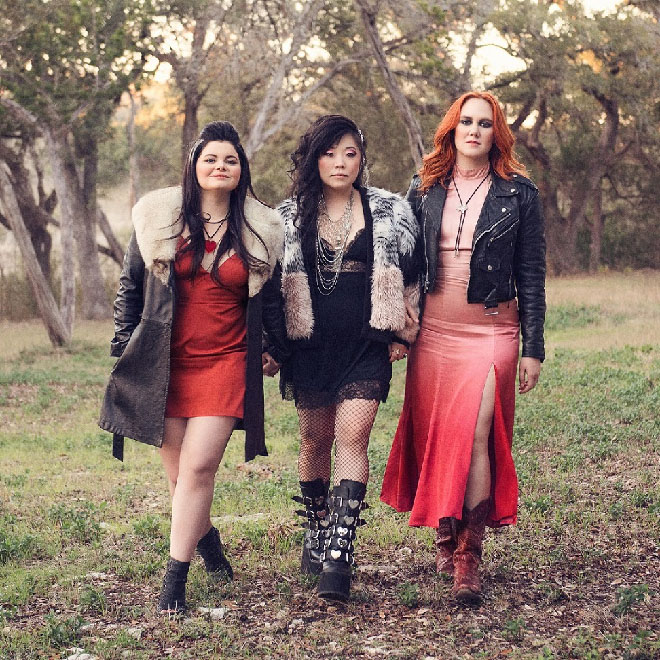
Photo credit Valerie Fremin Photography
Which song are you especially glad made it onto this new album Nobody’s Girl (released July 30 on Lucky Hound Music)?
Rebecca: “Lark” is a ballad that we wrote at Grace’s mom’s home in Ireland—while we were on tour in Europe. We had a few days off and spent them drinking tea, eating amazing cheese—and writing songs. One of us had what would become the first two lines of the song jotted in our journal, and it inspired a sort of group meditation on life, growth and loss. The song just kind of spilled out after that.
BettySoo: We all have some kind of perfectionism lurking inside of us, so it’s not unlike any of us to suggest edits and changes right up until the song is being cut. We were toying with the vocal arrangements for several of the songs—even as we recorded them, and we weren’t sure “So Far Away” was going to be finished in time. I remember us sitting on a bed in an adjoining suite to the studio, drilling the notes for “Tiger” and feeling over the moon about how it was going to sound.
What instruments/equipment can you not live without?
Rebecca: Two things—my Bayard Guitar and my iPhone. I’m constantly jotting down notes and recording phrases into my phone—then coming back to them later. All day—every day!
BettySoo: I am not usually a legal-pad-and-pen writer. I’m a sit-at-the-computer songwriter. I type much faster than I write. I love writing on paper, but with songwriting—I like a keyboard to type into—fast. I have my computer, a phone for recording, my ’65 Gibson, my open-tuned Taylor, my mid-60s Migma and my upright Yamaha piano. I’m not sponsored by any of those companies, but I certainly love the instruments, and they have coaxed almost all of my songs from me.
Grace: I need a guitar in my hands to write a song. Sometimes, I’ll get an idea when I’m away from my guitar. But even then, I’m imagining the chords and itching to get home, with guitar in hand, to finish the song. I have a Moonstone guitar. It’s a gorgeous instrument. More importantly, it’s my instrument. There’s nothing like playing my own guitar. There’s no place like home. (Laughs)
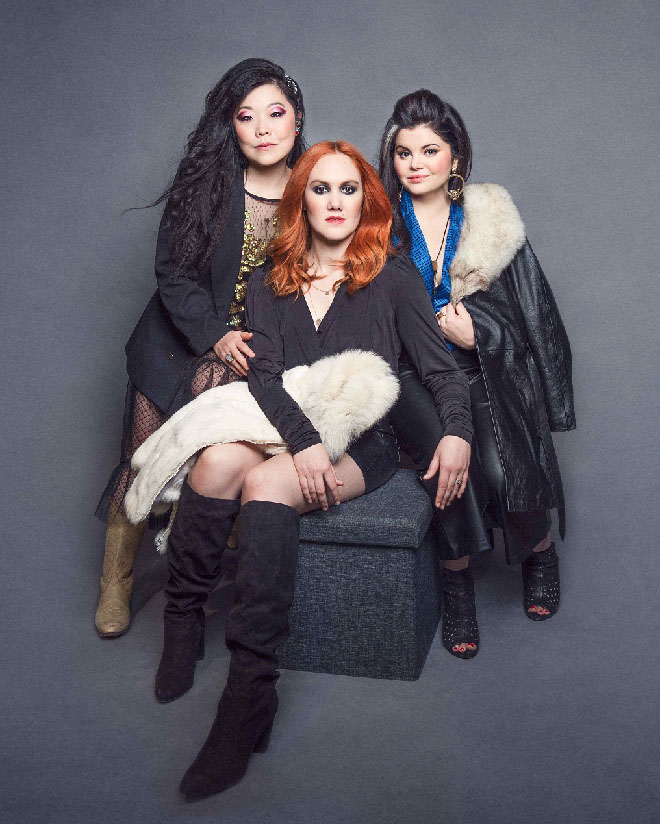
Photo credit Valerie Fremin Photography
Any accessories that help you write, record, perform?
Grace: I use Elixir strings and I love Kyser capos. I picked up my first Kyser capo at Camp NashBill from Bill Nash, who has MS. Late at night, when I was stumbling around the Kerrville Folk Festival campfires (an incredible community of songwriters)—looking for Camp Nashville—I stumbled onto Camp NashBill. Bill plays with Kyser capos—the shortcut ones which cover three strings in the middle. I combine it with a regular Kyser—and it gets all these wonderful sounds. It was my first experience. I like the way those capos feel.
BettySoo: On the Gibson, I have a Paige capo. I have Shubb capos. I have lots of Kyser capos—and even an old, thick 70s capos. I love the Kyser capos because they are fast and easy to use. I love the simple fact that everyone immediately knows how to use a Kyser. If I hand them a Kyser, they know exactly what to do. I also love that they produce different kinds of cuts and in so many fun colors.
Which Top 5 Musicians inspired you to become a musician?
Rebecca: Randy Newman—no one does smart and funny like him. Also, Joni Mitchell, Patty Griffin—and so many more I mentioned earlier.
BettySoo: They’re not necessarily my top five influences overall or even as a songwriter, but they could be. I have always had a hard time picking favorites—I don’t even have a favorite color. (Laughs) I like them all. But since I always wanted to be a harmony singer, I probably daydreamed about singing with: Lyle Lovett, Paul Simon, Guy Clark, Crowded House and Chris Isaak.
Grace: I’ve been obsessed with these five artists for a long time: Lauryn Hill, Dolly Parton, Joni Mitchell, the Beatles and Indigo Girls.
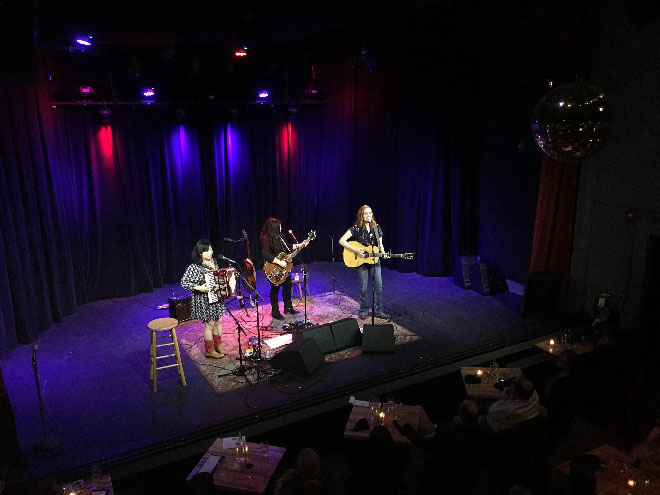
Photo credit Milly Parker
What are your Top 5 favorite albums of all time?
Rebecca: Blue (1971) — Joni Mitchell; 1000 Kisses (2002) — Patty Griffin; Home (2002) — The Chicks; Graceland (1986) — Paul Simon; Lost and Gone Forever (1999) — Guster.
BettySoo: Reading, Writing, and Arithmetic (1990) — The Sundays, I Love Everybody (1994) — Lyle Lovett, Graceland (1986) — Paul Simon; and Townes Van Zandt (1969)—Townes Van Zandt; Crowded House (1986) — Crowded House.
Grace: Swamp Ophelia (1994)—Indigo Girls; Red Album—aka 1962-1966 (1973) — The Beatles; Blue Album—aka 1967-1970 (1973) — The Beatles; Sweetheart of the Rodeo (1968) —The Byrds; The Miseducation of Lauryn Hill (1998) — Lauryn Hill; Blue (1971) — Joni Mitchell.
Tell us a “pinch me” moment when you thought “Wow, this is really happening to me!”
Rebecca: When I was a contestant on NBC’s The Voice and saw Christina Aguilera and Adam Levine’s chairs spin around. I still remember that feeling. There are so many things I enjoyed and learned from that experience. Biggest takeaway: when I now perform a live show on stage, for someone who bought a ticket, they’re not there to judge me—like a TV show with producers and lawyers. It taught me what judgement feels like—and I know I don’t like that. I much prefer an eager audience.
BettySoo: Singing harmonies for both Eliza Gilkyson’s and James McMurtry’s latest albums. They’re true heroes to me—as performers, songwriters and friends. I can’t believe they’re my friends. (Laughs) And I can’t believe I got to sing and record with them. I can now die happy.
Grace: I once opened for Jimmy Webb. That was a pivotal moment. He was unbelievably nice and signed my songwriting notebook.
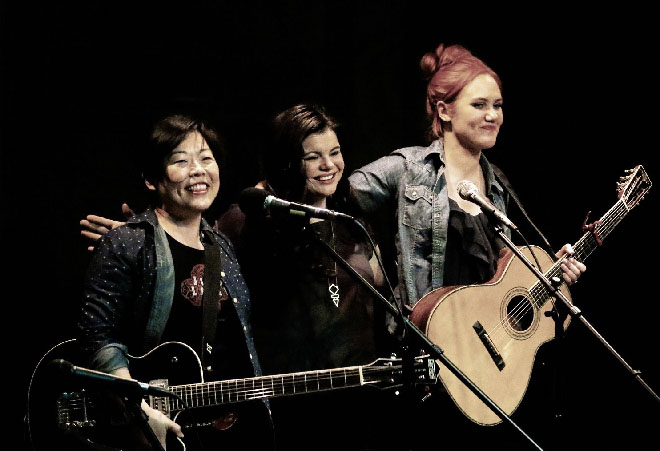
What is the best advice someone has given you?
Rebecca: “Don’t ‘should’ on yourself.”
BettySoo: One piece of wisdom I cling to and repeat—is from my high school art teacher Karla Koop: “It’s just art; you don’t have to like it.” That statement gets to the point better than “it’s a personal preference.” When we’d go into a museum, she let us know that we don’t have to get angry if you see something that doesn’t move us—it’s not a personal affront. It’s all art—you don’t have to like it. What gave this quote greater context—is that it’s from someone who gave their life to art. She’s saying it’s not about you—it doesn’t need your approval or disapproval. It doesn’t affect how your house stands. At the Kerrville Folk Festival, there’s such a celebration—of everyone who is doing what they love. The whole showcase—is a door into that community. Performing on that stage, as a contestant, is amazing because the producer doesn’t have a vote in the winner. They take it seriously—try not to make it all about personal taste—or what’s in the judges’ wheelhouse. It’s just art.
Grace: A while back I was complaining about something—some career hurdle or why I felt stuck. My very kind, always supportive, sweet-to-the-core mother uncharacteristically cut me off and said, “Grace. You have to be unstoppable.” That really hit home. She wasn’t diminishing the struggle or making light of it. She was pointing out the obvious: There’s always going to be something in my way. Everybody has hurdles. I’ve had my share and I’ve also had many fewer than others. I can’t let that stop me from pursuing what I want out of life. Moments come and go. I have to seize the moment I’m in and not let anything (even a pandemic or the voices in my own head) keep me from reaching my own potential. It’s a privilege to have the opportunities I have. I can’t waste them.
What is it about Blue Rock and Billy and Dodee Crockett that’s so special?
BettySoo: Billy and Dodee have a genuine heart for hospitality and they also have a high standard for excellence. They push themselves and gently coax it out of others—to reach that next level. They lead by example and are genuinely kind. They use their resources to maximize the potential of the situation. By doing that, they invite people to do the same. They don’t half-way anything. They do it all in an attitude of love and out of respect for what art can be—in celebration together. They have such a passion for music, community and hospitality that it maximizes the reach of everybody’s talent. An example is when you stay there, Dodee’s homemade granola and cookies are in the room. She’s a very busy person, but she makes time to take care of the details. They work so hard—out of love—and it’s contagious. I have so much respect for them. My heart is filled whenever I’m around them.
Rebecca: Billy and Dodee are really kind and they understand the value of community—of being good stewards of community. They walk the walk—of thinking globally of what they can do with what they have—to help musicians that they know and love, as well as provide a great service to the audience—the music community.
Grace: It’s this simple—with Billy and Dodee, you not only feel like family—you are family.
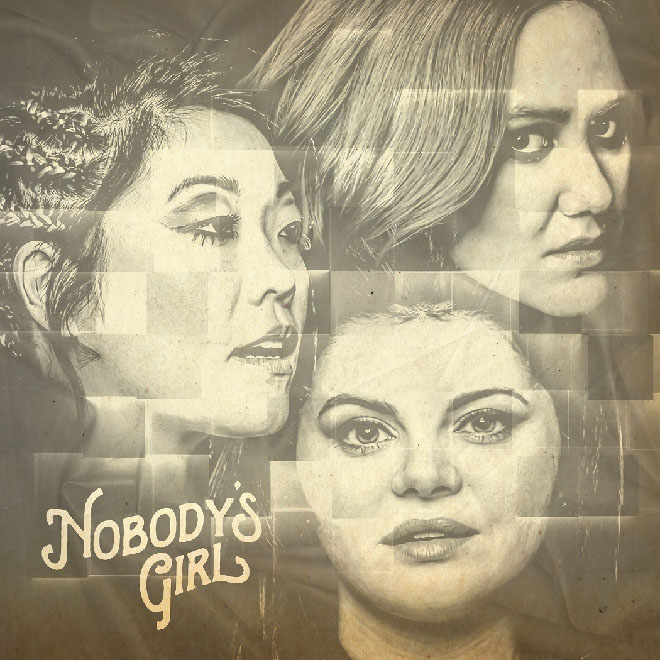
How do you remain hopeful in this strange and unique socio-political time?
BettySoo: I hate to say it because I don’t want anyone to think I’m not aware of how hard this time is for everyone—and of course I’ve been upset, angry, sad, depressed, triggered, traumatized, and mournful too. But each day, I realize it’s pretty easy to find both joy and hope because it takes a very quick glance to look at my life and know that I’m just so, so lucky.
Grace: I’ve been writing a lot more socially-conscious songs lately—a natural byproduct of being more aware. Plenty of other artists are focusing on writing exclusively happy, positive, uplifting songs. Songs you can dance to. Songs that make you smile—that’s important too. I’m not that kind of songwriter, but I respect that calling. I write from wherever I happen to be. If I’m happy, I write a happy song. If I’m sad, I write a sad song. If the world is on fire, so are my songs. They’re fairly candid that way. Not always toe-tappers, but I come by them honestly.
Rebecca: I always remember that if the bad guys seem to be winning, the story isn’t over yet.
Where can new fans get more info and stay updated?
www.WeAreNobodysGirl.com
Instagram: @nobodysgirlofficial
Twitter: @NobodysGirlBand
Facebook.com/nobodysgirlmusic
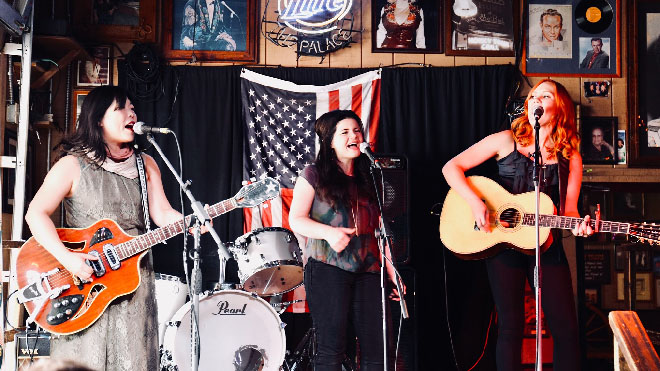
Photo credit Jenn Grinels



comment closed